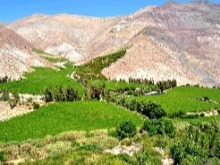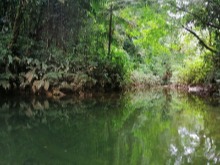
Tackling the drivers of deforestation with REDD+ results-based payments
Reducing the drivers of deforestation and forest degradation is essential for climate action and for the health of our planet. FAO supports countries seeking access to climate finance for transformative projects that will turn the tide on deforestation, spur sustainable agricultural development, conserve biodiversity and improve the well-being of vulnerable communities, including indigenous peoples – the world’s forest guardians.
Deforestation and land-use change are major drivers of global warming, accounting for eleven percent of global greenhouse gas emissions. Farmers, indigenous peoples and traditional communities have a critical role to play in preserving forests, and climate investments are key to securing land tenure rights, as well as promoting inclusive and participatory decision-making for improved land governance and sustainable forest management in the long term.
Working within the framework of the pilot programme and in partnership with host countries, FAO implements REDD+ results-based payments (RBPs) projects, for which funding is based on countries’ proven mitigation results and progress in halting deforestation over a certain period. Beneficiaries of these projects – in particular Argentina, Chile and Colombia – aim to raise their climate ambition by investing in sustainable forest and land-use practices that promote a paradigm shift towards low-emission, climate-resilient development.

About REDD+
REDD+ is a financing model negotiated under the United Nations Framework Convention on Climate Change (UNFCCC) to reduce greenhouse gas emissions from deforestation and forest degradation in developing countries. FAO supports countries’ efforts to access GCF funds for projects that reduce emissions from deforestation and forest degradation (REDD+ activities).
GCF initiated the REDD+ results-based payments pilot programme in 2017, in accordance with the Warsaw Framework for REDD+ and other REDD+ decisions under the UNFCCC.
GCF funds for the REDD+ results-based payments pilot programme were exhausted in 2020 and the programme’s future is being considered.
FAO-led REDD+ RBP projects
REDD+ RBP projects: key facts
Argentina REDD-plus RBP for results period 2014-2016
- USD 82 million in climate investments for mitigation action.
- Nearly 3 000 families from local and indigenous communities are being included in planning efforts to restore native forests, use forest resources sustainably, increase integrated livestock practices and prevent or respond quickly to forest fires.
- Sustainable forest management will help protect almost 4 million ha of native forests.
- 165 million tonnes of emissions were reduced during the 2014 to 2016 time period through successful efforts to combat deforestation.
Chile REDD-plus results-based payments for results period 2014-2016
- USD 63.6 million in climate investments for mitigation action.
- 30 000 hectares of forest will be restored including areas affected by forest fires.
- Over 57 000 people, including members of indigenous communities, will participate in the project’s afforestation, restoration and sustainable management activities.
- 18.4 million tonnes of emissions were reduced during the 2014 – 2016 time period by combatting deforestation and forest degradation, and enhancing forest stocks.
Colombia REDD+ Results-based Payments for results period 2015-2016
- USD 28.2 million in climate investments for mitigation action.
- More than 2 000 Colombian families will benefit from more sustainable production systems that are suited for the Amazon ecosystem and soils.
- 15 municipalities with the biggest areas in natural forest and highest deforestation rates in the Amazon Biome will be involved in capacity building activities to reduce deforestation.
- 7 million tonnes of emissions were avoided during the 2015 – 2016 time period through successful efforts to combat deforestation.





